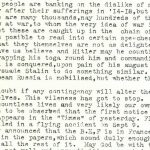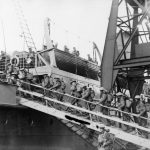Today’s thoughts centre on the conflict of ideas between the strength of anti-German feeling in Britain and other nations, and the overwhelming desire to avoid another war at all costs. Graham is of the opinion that “there are many thousands, nay hundreds of thousands in all the countries now at war, to whom the very idea of war is utterly detestable and abhorrent. But these are caught up in the chain of events and quite powerless”.
His statement highlights just how helpless ordinary citizens are when facing such prospects, and the reliance on those in positions of power to show compassion and a desire for compromise and peace, which of course history has time and again regrettably produced the opposite.
Graham moves on to again pondering Russian intentions, as he has done throughout his diary entries. He claims that “it is said that ¾ of European Russia is mobilised, but whether this is true or not I dont know”. As Russia invaded Poland themselves on September 17th, working to the territory agreements arranged as part of the secret Molotov-Ribbentrop Pact clauses, and shortly thereafter engaging in the “Winter War” with Finland, it would suggest that these assertions were fairly accurate. Events such as the Katyn massacre demonstrated the lengths to which the Soviet Union had similarly ambitious and destructive plans like Germany, until their ideas were no longer aligned and the focus became each other, with the launch by Germany of Operation Barbarossa in summer 1941.
Returning to record more information later that day, Graham mentions the sad news that the first notice of death that he had seen for an individual on active duty was for a Flying Officer Browne, who lost his life in a flying accident less than a week after Britain had entered the war. The impact that conflicts impose on peoples’ lives, and the contrast between one day living in peacetime and the next being at war, are stark.
Thomas also confirms that it has been “officially announced that the B.E.F is in France”. The reporting of this initial arrival of troops caused a crisis back in Britain, more of which will be discussed in tomorrow’s diary entry.
The British Expeditionary Force was formed during World War One, and was called upon again at the outbreak of war in 1939. Although until May 1940, there was a period of relative inactivity for the army, large German offensives and breakthroughs at this time lead to the retreat of British forces to Dunkirk, one of the last remaining ports offering a chance of escape. What followed was one of the greatest evacuation missions in history. Although this was a huge defeat for the Allies, and many thousands of troops were left behind and still engaged in combat, the events were transformed into positive propaganda by new Prime Minister Winston Churchill, who dubbed it “The Miracle of Dunkirk”.
Sources used:
https://wikipedia.org
https://iwm.org.uk


